Hyundai i30 Wagon vs Kia Stonic – Which car suits you better?
Two cars, one duel: Hyundai i30 Wagon meets Kia Stonic.
Which one wins in performance, efficiency and value for money? Find out now!
Costs and Efficiency:
Looking at overall running costs, both models reveal some interesting differences in everyday economy.
Kia Stonic has a clearly perceptible advantage in terms of price – it starts at 20100 £, while the Hyundai i30 Wagon costs 24800 £. That’s a price difference of around 4714 £.
Fuel consumption also shows a difference: Kia Stonic manages with 5.60 L and is therefore hardly perceptible more efficient than the Hyundai i30 Wagon with 5.70 L. The difference is about 0.10 L per 100 km.
Engine and Performance:
Power, torque and acceleration say a lot about how a car feels on the road. This is where you see which model delivers more driving dynamics.
When it comes to engine power, the Hyundai i30 Wagon has a somewhat edge – offering 140 HP compared to 115 HP. That’s roughly 25 HP more horsepower.
In acceleration from 0 to 100 km/h, the Hyundai i30 Wagon is barely noticeable quicker – completing the sprint in 9.80 s, while the Kia Stonic takes 10.70 s. That’s about 0.90 s faster.
In terms of top speed, the Hyundai i30 Wagon performs minimal better – reaching 197 km/h, while the Kia Stonic tops out at 182 km/h. The difference is around 15 km/h.
There’s also a difference in torque: Hyundai i30 Wagon pulls noticeable stronger with 253 Nm compared to 200 Nm. That’s about 53 Nm difference.
Space and Everyday Use:
Cabin size, boot volume and payload all play a role in everyday practicality. Here, comfort and flexibility make the difference.
Both vehicles offer seating for 5 people.
In curb weight, Kia Stonic is slight lighter – 1205 kg compared to 1316 kg. The difference is around 111 kg.
In terms of boot space, the Hyundai i30 Wagon offers clearly more room – 602 L compared to 352 L. That’s a difference of about 250 L.
In maximum load capacity, the Hyundai i30 Wagon performs noticeable better – up to 1650 L, which is about 495 L more than the Kia Stonic.
When it comes to payload, Hyundai i30 Wagon somewhat takes the win – 524 kg compared to 445 kg. That’s a difference of about 79 kg.
Who comes out on top?
Overall, the Hyundai i30 Wagon shows itself to be wins the duel decisively and secures the title of DriveDuel Champion.
It convinces with the more balanced overall package and proves to be the more versatile choice for everyday use.
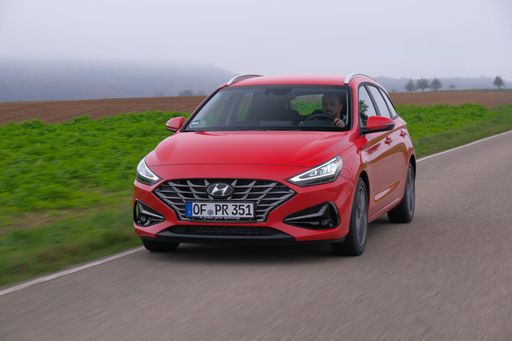 @ Hyundai Motor Company
@ Hyundai Motor Company
Hyundai i30 Wagon
Hyundai i30 Wagon
The Hyundai i30 Wagon offers a blend of practicality and style, making it a popular choice for families and those in need of extra space. Its sleek exterior and comfortable interior provide a pleasant driving experience, while advanced safety features ensure peace of mind on the road. The i30 Wagon stands out with its impressive fuel efficiency and reliability, catering to both urban and rural lifestyles.
details @ Hyundai Motor Company
@ Hyundai Motor Company
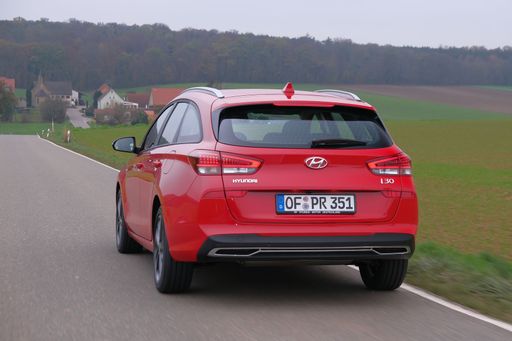 @ Hyundai Motor Company
@ Hyundai Motor Company
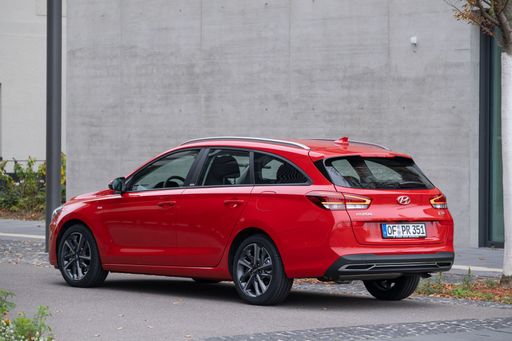 @ Hyundai Motor Company
@ Hyundai Motor Company
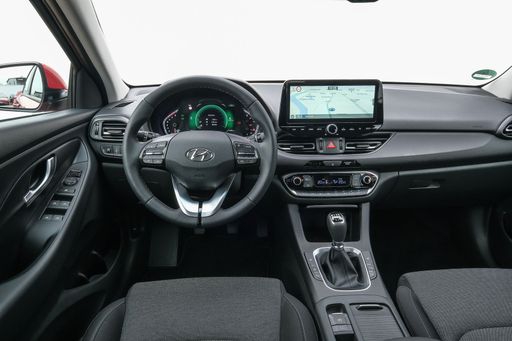 @ Hyundai Motor Company
@ Hyundai Motor Company
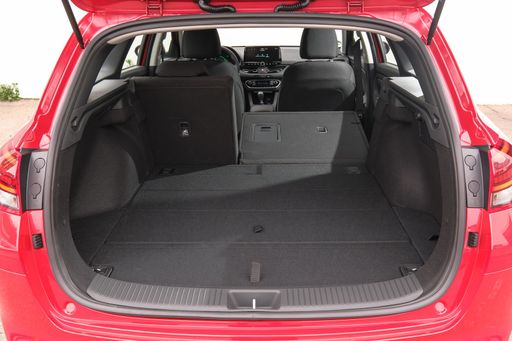 @ Hyundai Motor Company
@ Hyundai Motor Company
Kia Stonic
The Kia Stonic is a sprightly compact crossover that mixes city-friendly agility with a cheeky, modern design — perfect for buyers who want style without sacrificing sense. Inside it serves up clever practicality and a bright, well-equipped cabin, making everyday driving feel a bit more fun than it has any right to be.
details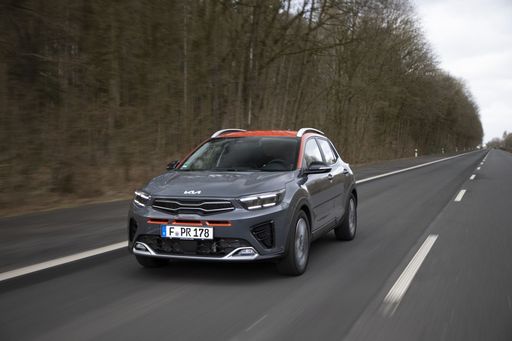 @ Kia Corporation
@ Kia Corporation
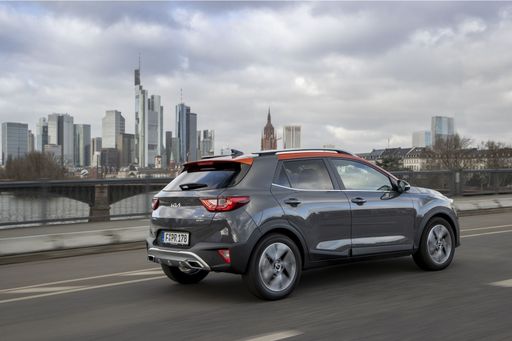 @ Kia Corporation
@ Kia Corporation
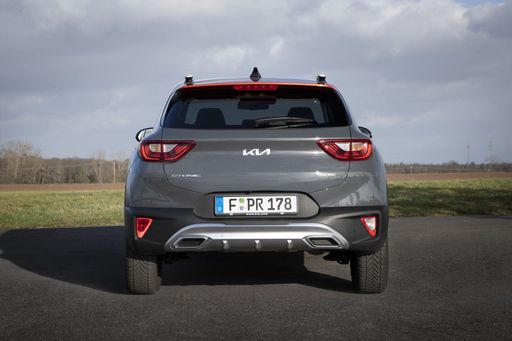 @ Kia Corporation
@ Kia Corporation
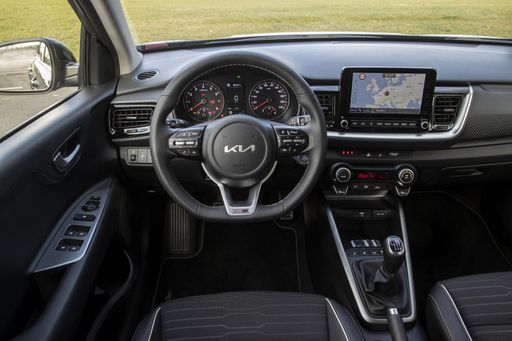 @ Kia Corporation
@ Kia Corporation
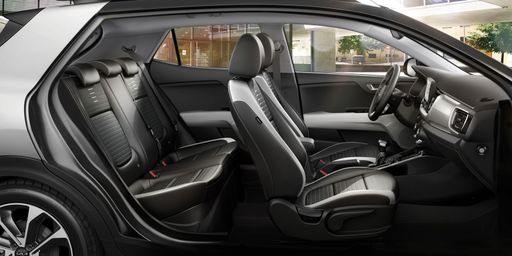 @ Kia Corporation
@ Kia Corporation
 @ Hyundai Motor Company
@ Hyundai Motor Company
|
 @ Kia Corporation
@ Kia Corporation
|
|
|
|
Costs and Consumption |
|
|---|---|
|
Price
24800 - 30100 £
|
Price
20100 - 26600 £
|
|
Consumption L/100km
5.7 - 6 L
|
Consumption L/100km
5.6 - 5.9 L
|
|
Consumption kWh/100km
-
|
Consumption kWh/100km
-
|
|
Electric Range
-
|
Electric Range
-
|
|
Battery Capacity
-
|
Battery Capacity
-
|
|
co2
130 - 136 g/km
|
co2
127 - 133 g/km
|
|
Fuel tank capacity
50 L
|
Fuel tank capacity
45 L
|
Dimensions and Body |
|
|---|---|
|
Body Type
Estate
|
Body Type
SUV
|
|
Seats
5
|
Seats
5
|
|
Doors
5
|
Doors
5
|
|
Curb weight
1316 - 1461 kg
|
Curb weight
1205 - 1270 kg
|
|
Trunk capacity
602 L
|
Trunk capacity
352 L
|
|
Length
4585 mm
|
Length
4165 mm
|
|
Width
1795 mm
|
Width
1760 mm
|
|
Height
1475 mm
|
Height
1520 mm
|
|
Max trunk capacity
1650 L
|
Max trunk capacity
1155 L
|
|
Payload
439 - 524 kg
|
Payload
440 - 445 kg
|
Engine and Performance |
|
|---|---|
|
Engine Type
Petrol, Petrol MHEV
|
Engine Type
Petrol, Petrol MHEV
|
|
Transmission
Manuel, Automatic
|
Transmission
Manuel, Automatic
|
|
Transmission Detail
Manual Gearbox, Dual-Clutch Automatic
|
Transmission Detail
Manual Gearbox, Dual-Clutch Automatic
|
|
Drive Type
Front-Wheel Drive
|
Drive Type
Front-Wheel Drive
|
|
Power HP
100 - 140 HP
|
Power HP
100 - 115 HP
|
|
Acceleration 0-100km/h
9.8 - 13.3 s
|
Acceleration 0-100km/h
10.7 - 12.1 s
|
|
Max Speed
178 - 197 km/h
|
Max Speed
179 - 182 km/h
|
|
Torque
172 - 253 Nm
|
Torque
172 - 200 Nm
|
|
Number of Cylinders
3 - 4
|
Number of Cylinders
3
|
|
Power kW
74 - 103 kW
|
Power kW
74 - 85 kW
|
|
Engine capacity
998 - 1482 cm3
|
Engine capacity
998 cm3
|
General |
|
|---|---|
|
Model Year
2024
|
Model Year
2025
|
|
CO2 Efficiency Class
D, E
|
CO2 Efficiency Class
D
|
|
Brand
Hyundai
|
Brand
Kia
|
What drivetrain options does the Hyundai i30 Wagon have?
Available configurations include Front-Wheel Drive.
The prices and data displayed are estimates based on German list prices and may vary by country. This information is not legally binding.
